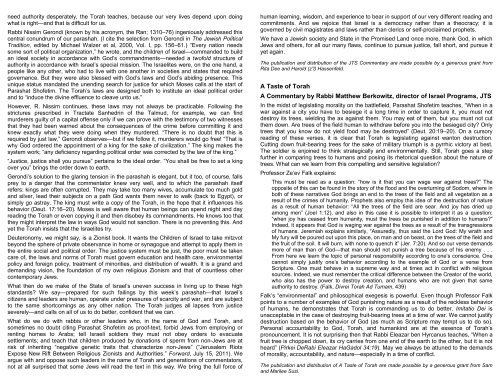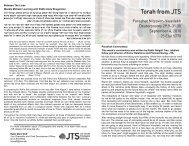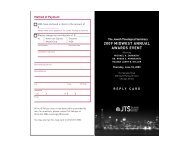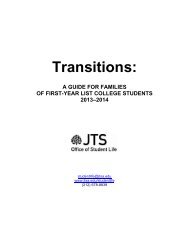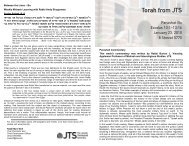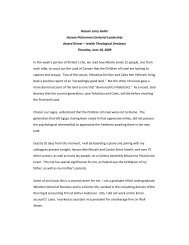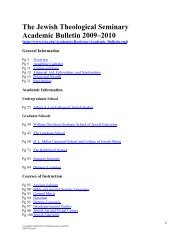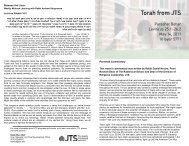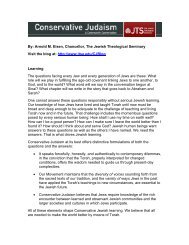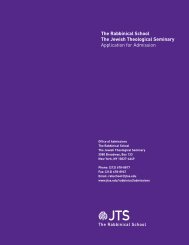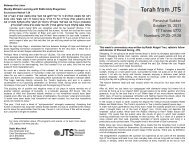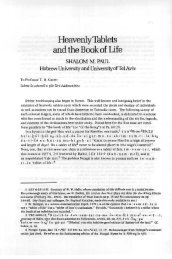Torah from JTS Shofetim 5771
Torah from JTS Shofetim 5771
Torah from JTS Shofetim 5771
You also want an ePaper? Increase the reach of your titles
YUMPU automatically turns print PDFs into web optimized ePapers that Google loves.
need authority desperately, the <strong>Torah</strong> teaches, because our very lives depend upon doing<br />
what is right—and that is difficult for us.<br />
Rabbi Nissim Gerondi (known by his acronym, the Ran; 1310–76) ingeniously addressed this<br />
central conundrum of our parashah. (I cite the selection <strong>from</strong> Gerondi in The Jewish Political<br />
Tradition, edited by Michael Walzer et al, 2000, Vol. I, pp. 156–61.) “Every nation needs<br />
some sort of political organization,” he wrote, and the children of Israel—commanded to build<br />
an ideal society in accordance with God’s commandments—needed a twofold structure of<br />
authority in accordance with Israel’s special mission. The Israelites were, on the one hand, a<br />
people like any other, who had to live with one another in societies and states that required<br />
governance. But they were also blessed with God’s laws and God’s abiding presence. This<br />
unique status mandated the unending search for justice for which Moses calls at the start of<br />
Parashat <strong>Shofetim</strong>. The <strong>Torah</strong>’s laws are designed both to institute an ideal political order<br />
and to “induce the divine effluence to cleave unto us.”<br />
However, R. Nissim continues, these laws may not always be practicable. Following the<br />
strictures prescribed in Tractate Sanhedrin of the Talmud, for example, we can find<br />
murderers guilty of a capital offense only if we can prove with the testimony of two witnesses<br />
that they had been warned about the consequences of the crime before committing it and<br />
knew exactly what they were doing when they murdered. “There is no doubt that this is<br />
required by just law,” Gerondi observes—but if we follow it, murderers would go free! “That is<br />
why God ordered the appointment of a king for the sake of civilization.” The king makes the<br />
system work; “any deficiency regarding political order was corrected by the law of the king.”<br />
“Justice, justice shall you pursue” pertains to the ideal order. “You shall be free to set a king<br />
over you” brings the order down to earth.<br />
Gerondi’s solution to the glaring tension in the parashah is elegant, but it too, of course, falls<br />
prey to a danger that the commentator knew very well, and to which the parashah itself<br />
refers: kings are often corrupted. They may take too many wives, accumulate too much gold<br />
and silver, lead their subjects on a path God wants them never to walk (back to Egypt), or<br />
simply go astray. The king must write a copy of the <strong>Torah</strong>, in the hope that it influences his<br />
behavior (Deut. 17:16–20). Moses is well aware that human beings can spend night and day<br />
reading the <strong>Torah</strong> or even copying it and then disobey its commandments. He knows too that<br />
they might interpret the law in ways God would not sanction. There is no preventing this. And<br />
yet the <strong>Torah</strong> insists that the Israelites try.<br />
Deuteronomy, we might say, is a Zionist book. It wants the Children of Israel to take mitzvot<br />
beyond the sphere of private observance in home or synagogue and attempt to apply them in<br />
the entire social and political order. The justice system must be just, the poor must be taken<br />
care of, the laws and norms of <strong>Torah</strong> must govern education and health care, environmental<br />
policy and foreign policy, treatment of minorities, and distribution of wealth. It is a grand and<br />
demanding vision, the foundation of my own religious Zionism and that of countless other<br />
contemporary Jews.<br />
What then do we make of the State of Israel’s uneven success in living up to these high<br />
standards? We say—prepared for such failings by this week’s parashah—that Israel’s<br />
citizens and leaders are human, operate under pressures of scarcity and war, and are subject<br />
to the same shortcomings as any other nation. The <strong>Torah</strong> judges all lapses <strong>from</strong> justice<br />
severely—and calls on all of us to do better, confident that we can.<br />
What do we do with rabbis or other leaders who, in the name of God and <strong>Torah</strong>, and<br />
sometimes no doubt citing Parashat <strong>Shofetim</strong> as proof-text, forbid Jews <strong>from</strong> employing or<br />
renting homes to Arabs; tell Israeli soldiers they must not obey orders to evacuate<br />
settlements; and teach that children produced by donations of sperm <strong>from</strong> non-Jews are at<br />
risk of inheriting “negative genetic traits that characterize non-Jews” (“Jerusalem Riots<br />
Expose New Rift Between Religious Zionists and Authorities.” Forward, July 15, 2011). We<br />
argue with and oppose such leaders in the name of <strong>Torah</strong> and generations of commentators,<br />
not at all surprised that some Jews will read the text in this way. We bring the full force of<br />
human learning, wisdom, and experience to bear in support of our very different reading and<br />
commitments. And we rejoice that Israel is a democracy rather than a theocracy; it is<br />
governed by civil magistrates and laws rather than clerics or self-proclaimed prophets.<br />
We have a Jewish society and State in the Promised Land once more, thank God, in which<br />
Jews and others, for all our many flaws, continue to pursue justice, fall short, and pursue it<br />
yet again.<br />
The publication and distribution of the <strong>JTS</strong> Commentary are made possible by a generous grant <strong>from</strong><br />
Rita Dee and Harold (z”l) Hassenfeld.<br />
A Taste of <strong>Torah</strong><br />
A Commentary by Rabbi Matthew Berkowitz, director of Israel Programs, <strong>JTS</strong><br />
In the midst of legislating morality on the battlefield, Parashat <strong>Shofetim</strong> teaches, “When in a<br />
war against a city you have to besiege it a long time in order to capture it, you must not<br />
destroy its trees, wielding the ax against them. You may eat of them, but you must not cut<br />
them down. Are trees of the field human to withdraw before you into the besieged city? Only<br />
trees that you know do not yield food may be destroyed” (Deut. 20:19–20). On a cursory<br />
reading of these verses, it is clear that <strong>Torah</strong> is legislating against wanton destruction.<br />
Cutting down fruit-bearing trees for the sake of military triumph is a pyrrhic victory at best.<br />
The soldier is enjoined to think strategically and environmentally. Still, <strong>Torah</strong> goes a step<br />
further in comparing trees to humans and posing its rhetorical question about the nature of<br />
trees. What can we learn <strong>from</strong> this compelling and sensitive legislation?<br />
Professor Ze’ev Falk explains:<br />
This must be read as a question: “how is it that you can wage war against trees?” The<br />
opposite of this can be found in the story of the flood and the overturning of Sodom, where in<br />
both of these narratives God brings an end to the trees of the field and all vegetation as a<br />
result of the crimes of humanity. Prophets also employ this idea of the destruction of nature<br />
as a result of human behavior: “All the trees of the field are sear. And joy has dried up<br />
among men” (Joel 1:12), and also in this case it is possible to interpret it as a question:<br />
“when joy has ceased <strong>from</strong> humanity, must the trees be punished in addition to humans?”<br />
Indeed, it appears that God is waging war against the trees as a result of the transgressions<br />
of humans. Jeremiah explains similarly, “Assuredly, thus said the Lord God: My wrath and<br />
My fury will be poured out upon this place, on man and on beast, on the trees of the field and<br />
the fruit of the soil. It will burn, with none to quench it” (Jer. 7:20). And so our verse demands<br />
more of man than of God—that man should not punish a tree because of his enemy . . .<br />
From here we learn the topic of personal responsibility according to one’s conscience. One<br />
cannot simply justify one’s behavior according to the example of God or a verse <strong>from</strong><br />
Scripture. One must behave in a supreme way and at times act in conflict with religious<br />
sources. Indeed, we must remember the critical difference between the Creator of the world,<br />
who also has the power to destroy creation, and humans who are not given that same<br />
authority to destroy. (Falk, Divrei <strong>Torah</strong> Ad Tumam, 439)<br />
Falk’s “environmental” and philosophical exegesis is powerful. Even though Professor Falk<br />
points to a number of examples of God punishing nature as a result of the reckless behavior<br />
of humans, he demonstrates that <strong>Torah</strong> is commanding us to do better. Imitatio Dei is<br />
unacceptable in the case of destroying fruit-bearing trees at a time of war. We cannot justify<br />
destruction based on the behavior of God (as much as Scripture may tempt us to do so).<br />
Personal accountability to God, <strong>Torah</strong>, and humankind are at the essence of <strong>Torah</strong>’s<br />
pronouncement. It is not surprising then that Rabbi Eleazar ben Hyrcanus teaches, “When a<br />
fruit tree is chopped down, its cry carries <strong>from</strong> one end of the earth to the other, but it is not<br />
heard” (Pirkei DeRabi Eleazar HaGadol 34:19). May we always be attuned to the demands<br />
of morality, accountability, and nature—especially in a time of conflict.<br />
The publication and distribution of A Taste of <strong>Torah</strong> are made possible by a generous grant <strong>from</strong> Sam<br />
and Marilee Susi.


